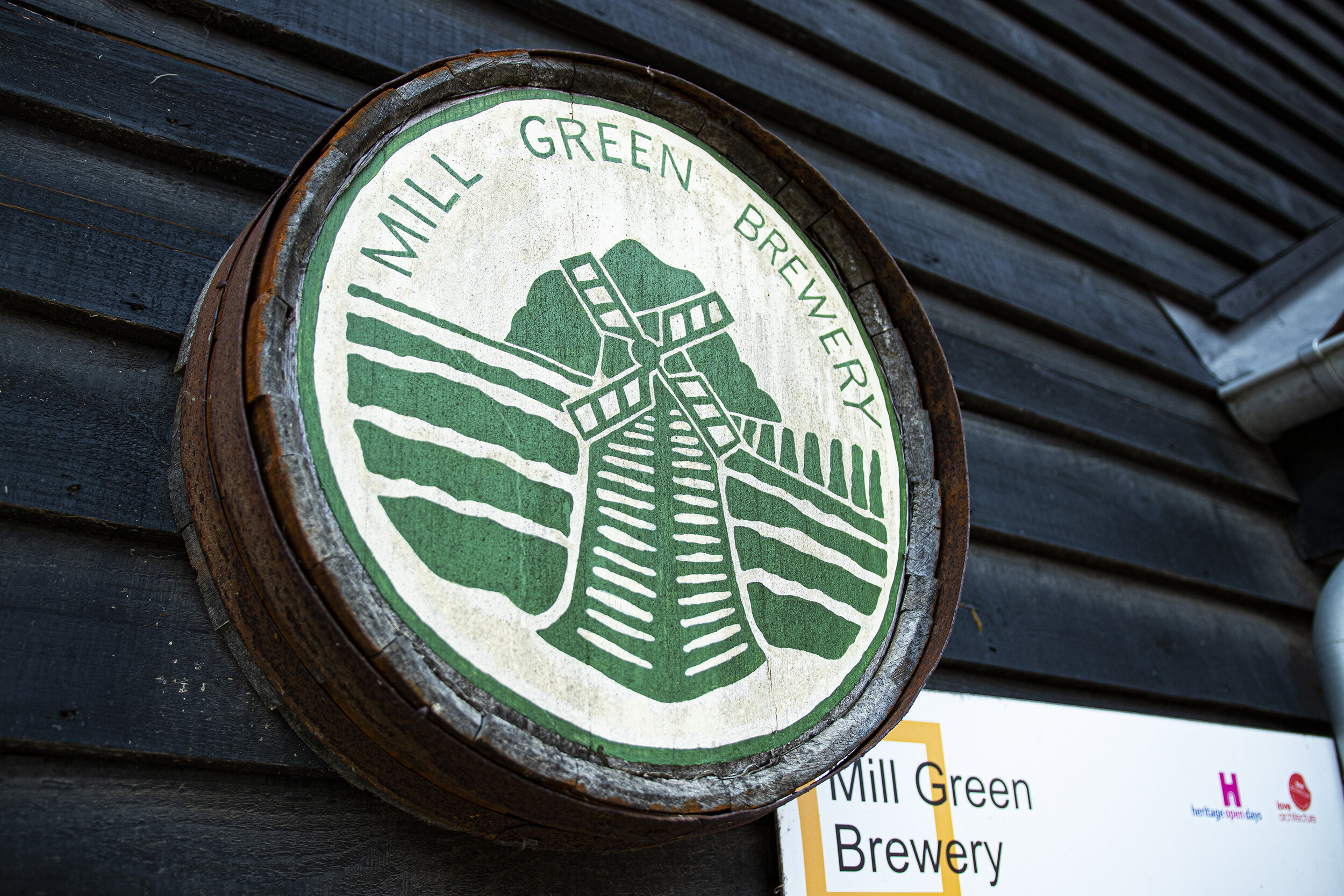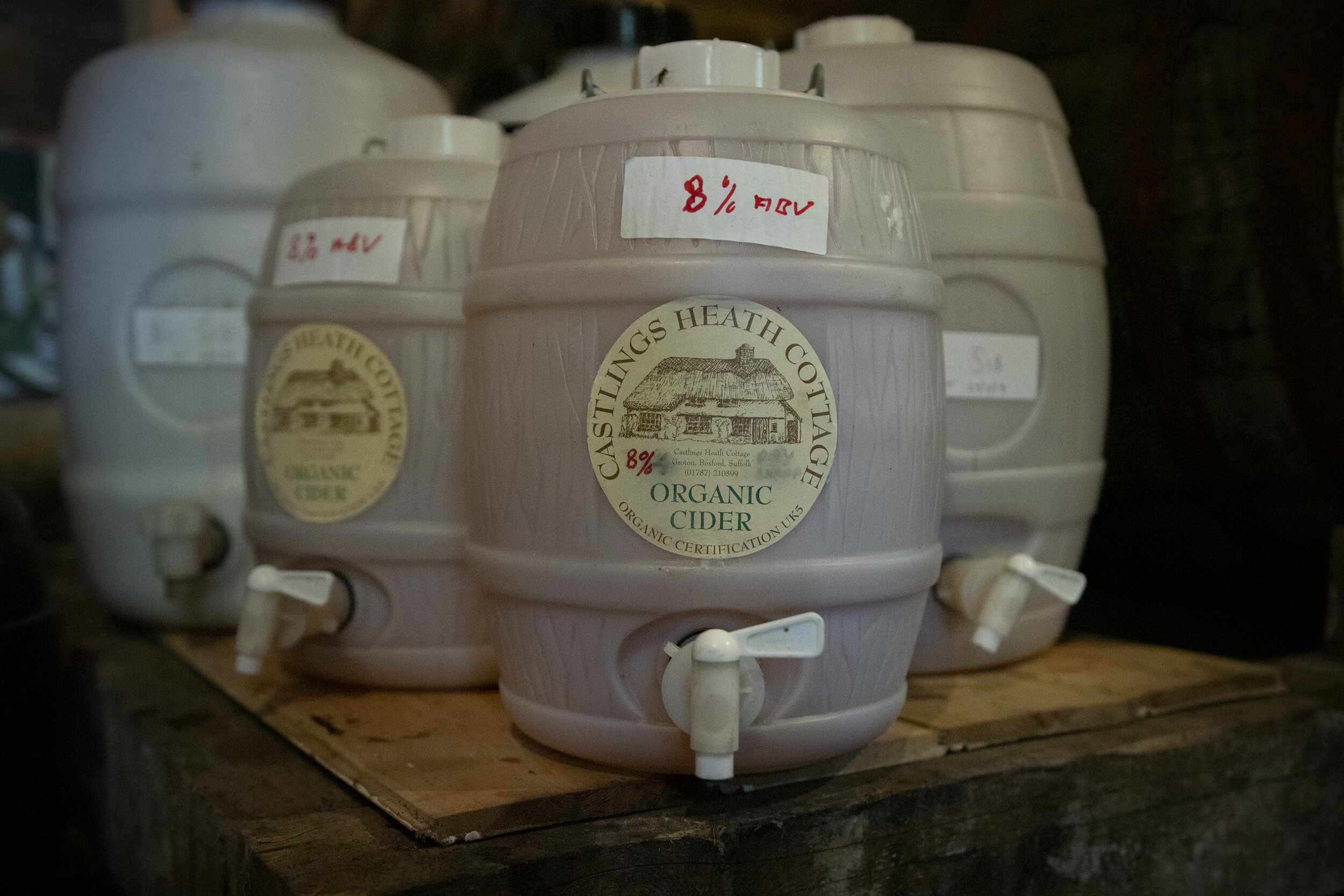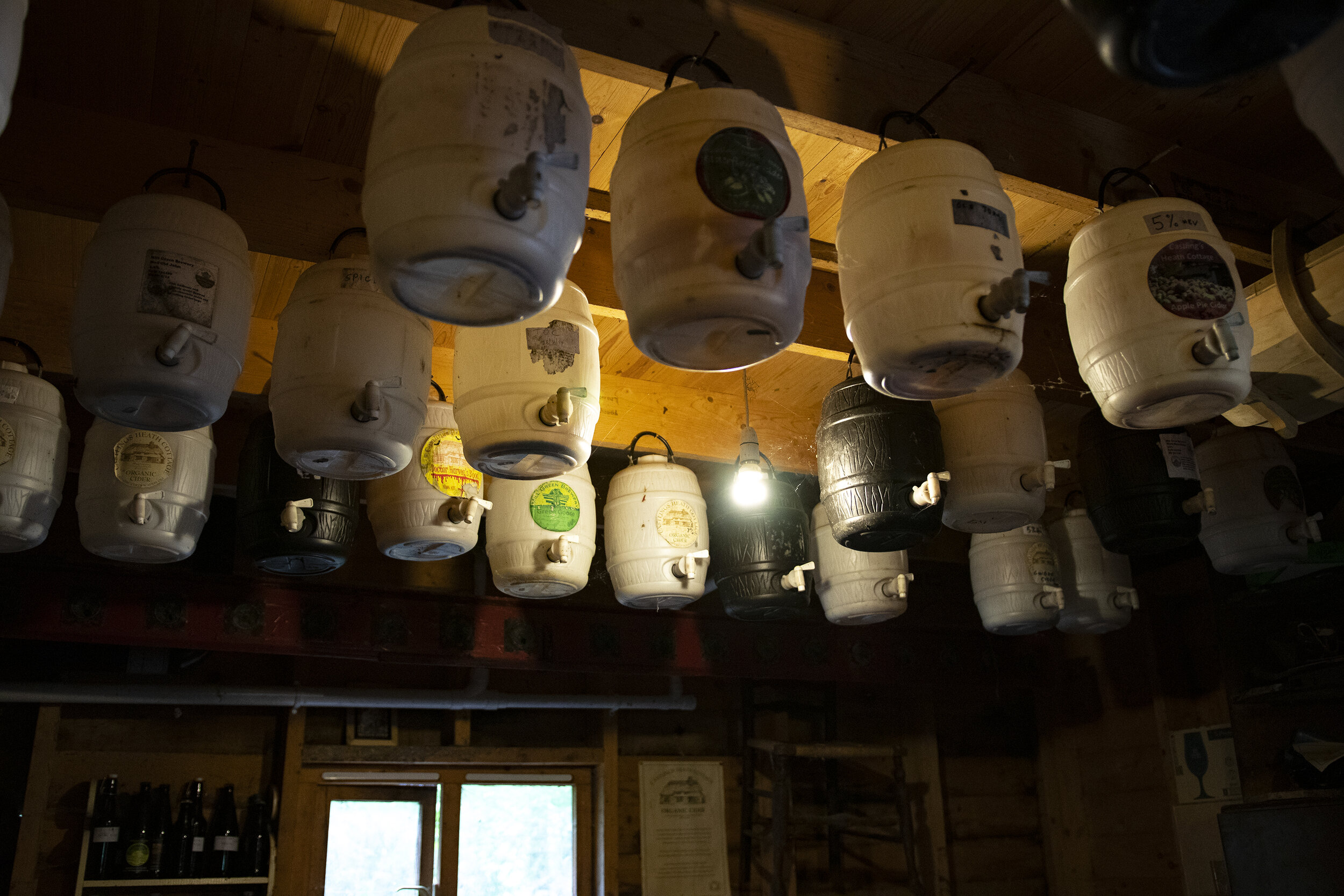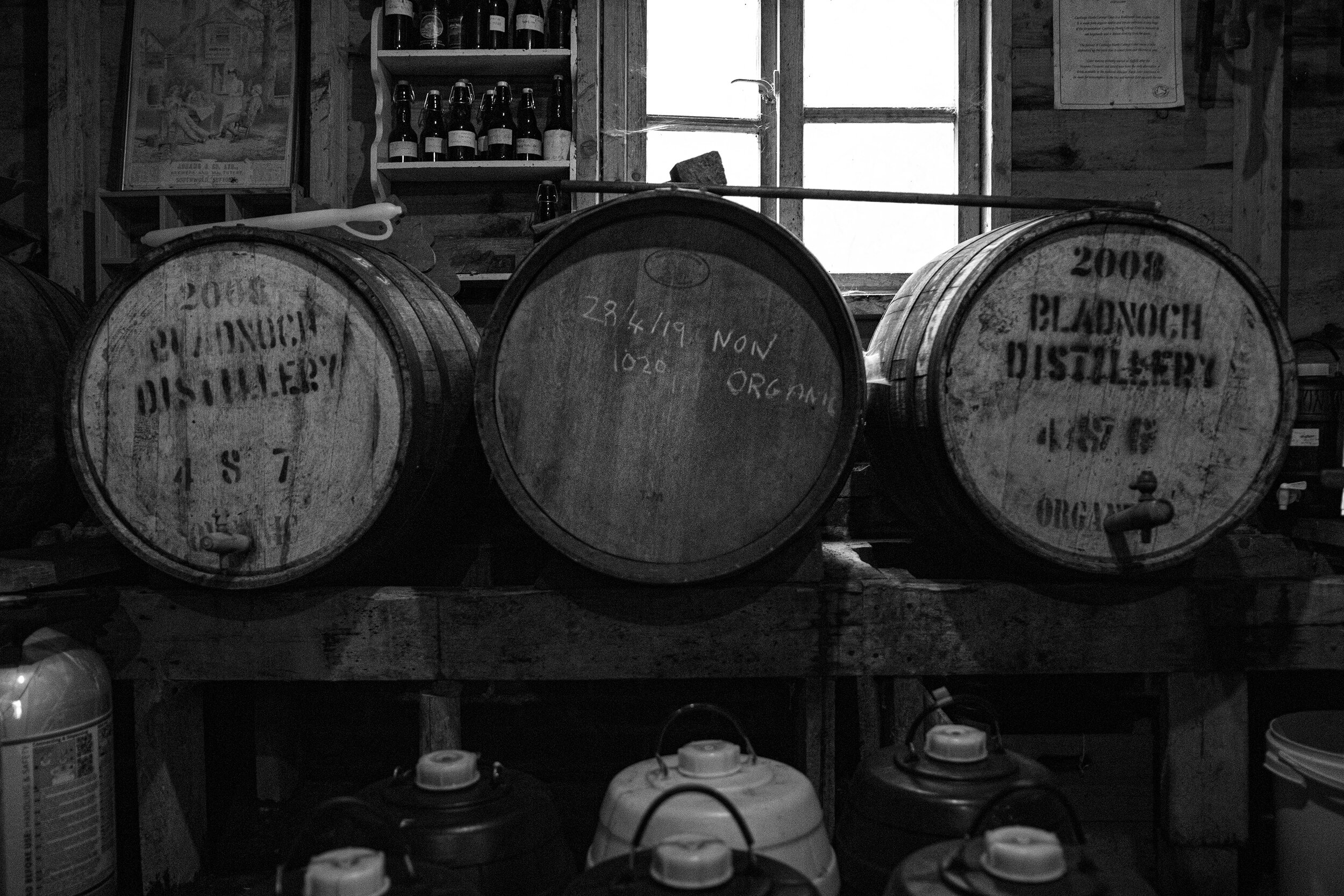There are breweries that make wild beer, and then there are truly wild breweries. Little Earth Project falls into the latter camp.
The brewery is in the middle of nowhere, down a maze of country lanes that seem to go in circles. Its home county of Suffolk, in southeastern England, is as agricultural as Britain gets—barley and wheat fields stretch to the horizon in every direction, broken up only by hedgerows, copses, and thatched-roof villages.
From the road, all you can see is the White Horse, a traditional pub frequented by locals and elderly hikers who relish the region’s lack of hills. Sessionable cask ales and pork pies have been the order of the day here for decades. Increasingly, though, the pub has become a beacon for beer geeks who come for its wild beer fridge and three Lindr machines behind the bar, both of which feature the unusual beers brewed right next door.
Little Earth Project is situated in the barn behind the pub, built from local timber and uneven brick floors. Neither material is ideal for a commercial brewery, and nor are the repurposed dairy tanks that form the brewhouse—even I struggle to tell the difference between the tun and the kettle. It all feels cobbled together, but also like it’s been there forever.
On the day I visit, the middle of the room is dominated by a long, foldout table. It is covered by punnets of raspberries, delivered that morning from a farm just a few miles away. Founder Tom Norton and his partner Dani Mountain stand hands on hips, assessing the situation.
“I should have bought another funnel,” he says finally.
He ordered one months ago, he explains, but the nozzle was too thin to fit any fruit, and he hadn’t gotten around to finding another. These raspberries are going to have to be added to the barrels of beer a handful at a time, and it’s going to take a while.
There are three barrels to be filled: one containing a Barley Wine, one a Stock Ale, and the other a big Golden Ale that already has cacao nibs and wild mint in it. That particular beer is organic and fermented with his house cider strain; to some, its recipe might seem wilfully obtuse. Most of Norton’s recipes do, but the decisions that underlie them are as natural as the ingredients.
Little Earth Project isn’t Norton’s first attempt at a brewery. The previous one was called Mill Green, and was housed in the same barn with the same equipment. It focused on cask ale but mostly used American hops, an approach that made it ahead of its time in 2008. For a few years Norton did well enough, squeezing the best he could out of a kit as old as he was, and selling to the White Horse or other local pubs. But as New World hops became widely used, competition from giant local breweries like Adnams and Greene King started to take its toll. Norton is many things, but he is no salesman. He needed the beer to do the talking. As business got tougher, Norton’s head was turned by something else.
“It’s difficult to compete with someone 1,000 times your size,” he says with a shrug, “and in the meantime I’d become really interested in sour beers, which were getting popular in the U.S. and parts of Europe. So I made the decision to change the way we did things and start a new company.”
“The idea was to look back hundreds of years ago, when you couldn’t go to a lab and get a certain type of yeast—you used what was local.”
Norton wanted to make something that no one else could; something that expressed an identity no one else had. That something came from his family’s garden shed, where his dad had been playing around with hard ciders since 1985—the year Norton was born. Castlings Heath Cottage Cider made just a few thousand liters a year, but working the press and hand bottling had been a formative part of Norton’s upbringing.
“As soon as we were old enough, we were out there helping,” he says. “My sister went into school once, when she was six or seven, and talked about the cider shed and was confused that other people in her class didn’t have one.”
The ciders were made from organic apples mostly from the family’s own orchard, and naturally fermented in bourbon barrels by yeasts on the skins. Coupled with the shed’s lack of temperature control, that meant the seasonal variations were pretty wild. To Norton, though, that lack of intervention was simply how cider was made. After a few years of brewing with lab yeasts as Mill Green, he decided a return to mixed fermentation and the vagaries of nature was a more compelling way of making beer.
“The name is a quote from [Jester King Brewery founder] Jeffery Stuffings,” says Norton, in reference to “Little Earth Project.” “Any brewery around the world can make a hoppy, American-style IPA, and he said he wanted Jester King to represent his ‘little piece of Earth.’ No one was doing that in the U.K., so we thought, ‘Is it because it’s a stupid idea?’ But the pieces of the jigsaw seemed to fit together.”
Completing that puzzle meant finding other ingredients that represented where the brewery was from. Luckily, Suffolk is one of the biggest barley-producing regions in England, but what really excited Norton was the availability of apples and hedgerow fruits from local farms. Having grown up fermenting fruit, Norton’s choice to make use of local produce seemed like the perfect way to marry his passions for beer and cider. The real question was whether anyone else would be as passionate about the project as he was.
In 2016, Norton released his first beers as Little Earth, landing on an IPA, a Porter and a Stock Ale. While the Stock Ale—a strong and long-matured Amber Ale, much like a Barley Wine—is a left-field choice, the others looked straight out of the basic brewery rulebook. Norton wasn’t playing it safe, though. All three were brewed using local malt, British hops, and cider yeast cropped from his dad’s barrels. That interplay meant the beers were dry and earthy, displaying plenty of Brettanomyces, Lactobacillus, and other funk. The IPA in particular bore no resemblance to what most beer drinkers would expect from the style—particularly as New England-influenced brewing had just started to take hold in the U.K.
“The idea was to look back hundreds of years ago, when you couldn’t go to a lab and get a certain type of yeast—you used what was local,” Norton says. “Looking back it was a risky thing to do, because you’re putting well-known beer style names on beers that don’t taste at all like our modern interpretations.”
To make sure the right message was put across, and that the beers ended up in the hands of people who would understand them, Norton chose his first customer very carefully. Beer Gonzo is a bottle shop, wholesaler, and taproom in Coventry, well known for stocking rare and niche beers, especially in the realm of mixed fermentation. Founder Anthony Akers leapt at the chance to launch the brewery, which he did with a meet-the-brewer event.
“Tom contacted me and just a look at his website told me this was exactly what we’re about,” says Akers. “It was one of the first U.K. breweries to go down that natural, organic route and really let nature take its course. Our customer base got just as excited as we did, and they thought the Stock Ale was absolutely insane.”
“It was one of the first U.K. breweries to go down that natural, organic route and really let nature take its course. Our customer base got just as excited as we did.”
The positive response was a relief, reassuring Norton that he had not only found a niche but that his little piece of Earth was capable of producing it. From those three early beers, he started to develop a more cohesive brewing approach, taking traditional British and Belgian styles and using his cider yeast to tie threads between them. His former cask brewery converted very easily to the styles he was making—all that was needed was a lot of extra wood. Most barrels were bought in from dealers, but some came from the cidery, including one that’s the root of all the beers—a barrel Norton constantly tops up with the lees from the best batches of Castlings Heath Cottage Cider, which is still run by his dad.
Using his own yeast and local barley wasn’t enough for Norton, however. In 2008, around the time that he opened Mill Green, his family had bought their own 14-acre field a short drive from the brewery. Much of it was dedicated to organic grain, which is floor-malted at Warminster Maltings, but Norton also planted 200 hop plants—including First Gold, Fuggles, Bramling Cross, and Boadicea varieties. Most of these are used in fresh-hop Saisons every autumn, but a proportion of each harvest is set aside to age, and is used in the year-round beers. In the matter of just a few years, Norton had managed to create a brewery that relied on produce all from just a few miles away.
Romance aside, though, there were still plenty of issues to resolve and work to be done. Cashflow is one of the greatest challenges for any brewery focused on wild beer. The amount of time between paying for the ingredients and selling the beer could be years, and rate of sale means repeat orders can be slow to come in. So Norton started work on a house beer, one that was still made with the yeast that was so important to his identity, but which could be produced in just a few months. What he came up with was a Saison recipe that blended a classic Belgian strain with his own mix of orchard bugs.
“Depending on your hopping rates, you end up with a funky, really dry, and slightly acidic beer you can produce relatively quickly,” he says. “Because they’re so dry they taste like ciders, so we looked at what we’d done with those in the past, like adding elderflower and hedgerow fruits.”
Not only were these organic Saisons wonderfully crisp and fresh, they also worked as a base for blending and fruiting—and Norton was able to create constant demand by releasing a run of seasonal versions loaded with fruits and flowers, much like an IPA brewery would with different hops.
Another way to make the business viable as it grew was to establish a taproom, and bring drinkers to the brewery. It wasn’t just a financial decision: even if plenty of people had understood what Norton was trying to achieve, lots more didn’t. In this modern age, feedback is instant and the internet wasn’t always kind to Little Earth’s beers. When he wasn’t lamenting and laughing at the terrible reviews on Untappd, Norton was trying to educate his audience with photos of pellicles and in-depth, day-to-day details of the beers he made.
But the best way to change the hearts and minds of Britain’s sour skeptics was to meet them, and getting the beers into the pub next door would be a great way to do that. Luckily, Norton’s dad had owned the pub since before the days of Mill Green.
The White Horse had been run by the same landlords for decades, Cliff and Penny Baker. Cliff was a local character whose business model was to run the exact kind of pub he would want to drink in. He bought it out of a Greene King tie and cultivated a reputation as a biker’s bar, adding a campsite for those on the road as well as an annual dark beer festival. When the pair retired in 2005 the pub was doing well, but, with a shift in focus, was capable of doing a lot better. The Nortons loved the place and decided to buy it to ensure its future, using the money Norton’s dad had made as an organic grain broker.
They brought in a manager who ran the pub day-to-day and happily bought the Mill Green beers being made next door for the best part of a decade. In 2015, though, the family decided it was best to take a step back from the pub to retain their focus on Little Earth, which was about to launch. They leased the building out to a couple, but the relationship was short-lived. The new landlords had no interest in the esoteric Little Earth beers—or indeed any craft beer—which required more upselling and education to keep moving. When the lease ran out in 2018, the Nortons decided not to renew it, and to take the pub back.
The timing was far from perfect. Little Earth was just starting to make a name for itself, and Norton had little headspace for running two businesses. The family opted to hire a new manager and planned a reopening party on July 5th, 2018, inviting the locals, press, and fans of the brewery along. The new manager, however, quickly made it clear she wasn’t up to the task. On the day of the party, just an hour before the pub opened, she quit.
Norton met Mountain on the beer festival circuit in 2017. Originally from Canada, Mountain had been living in Edinburgh, Scotland, freelancing as a marketing specialist for breweries. Despite the distance, they fell in love quickly, and spent the next few months flying between their respective homes to see each other. Mountain loved Edinburgh, but accepted that Norton couldn’t leave his brewery behind, and decided to move down.
“When I was in Edinburgh I was like, ‘I’m gonna move down, but I don’t want to be super absorbed, I don’t want to work for the brewery—I want to have my own life,’” she says.
That didn’t last. She arrived in May 2018, a few days before the Nortons took the White Horse back. She started doing bar shifts while she looked for work, but found herself running the front of house after noticing some of the bar staff hadn’t even been shown how to pour a pint. On the day of the launch party, she took over the whole place.
“We might rewild some of the area to turn it into woodland. It’s partly because it’s the right thing to do, but we can also encourage certain things to grow.”
“The manager quit at 11 in the morning and I had to open up at 12. We had lots of people coming up for it who were camping in the field and super excited. Tom was going to do lots of tours and they were going to spend lots of money. I had some experience in bar management, but it taught me the rest pretty quick.”
It took them until October to find a replacement to run the pub, by which time Mountain was fully absorbed into the business, brewery, and family. To hear her laugh about it now, you suspect she wouldn’t have had it any other way. These days, alongside some freelance work, she deals with pretty much the entire Little Earth workload outside of the brewhouse.
“If Tom needs help bottling I’ll help him,” she says. “But then I design the labels; write the press releases; and do the accounts, sales and payroll. I do a bit of the social media for the pub and brewery too—more of the paid advertising side because Tom prefers to take pictures of pellicles.”
Imagewise, the brewery has become about the pair of them, Norton’s twinkling eyes and Mountain’s bright red hair visible across any pub or festival. Between them, and with the Norton family’s ongoing support, the future looks bright for the brewery. They are unable to brew or age enough beer to meet demand, which often means heading to the source is the best way to get ahold of it.
Even so, there are no grand plans for expansion—just organic growth that suits the beer. As we drive to his field in a rusted, crusty Land Rover, Norton outlines his idea. He’s eyeing up a patch of grass for a new barrel store with a coolship in the rafters, and hopes that his decision to avoid putting “brewery” in his name will allow him to launch a range of ciders under the Little Earth umbrella. To do so, he has plans to move his barley production elsewhere, and fill the field with brambles, gorse, and other potential beer and cider ingredients.
“We might rewild some of the area to turn it into woodland,” he says. “It’s partly because it’s the right thing to do, but we can also encourage certain things to grow. One part might become traditional heathland and house a few sheep, where the only things that will grow will be things they won’t eat, which happen to be gorse and elder plants. Elderberries are up there with cherries as the perfect fruit to add to sour beer.”
Not many brewery growth plans involve letting nature take its course, but Norton has come to trust it, to rely on it. His little piece of Earth will never really be his, but when it comes to running a wild brewery, that’s kind of the point.









































